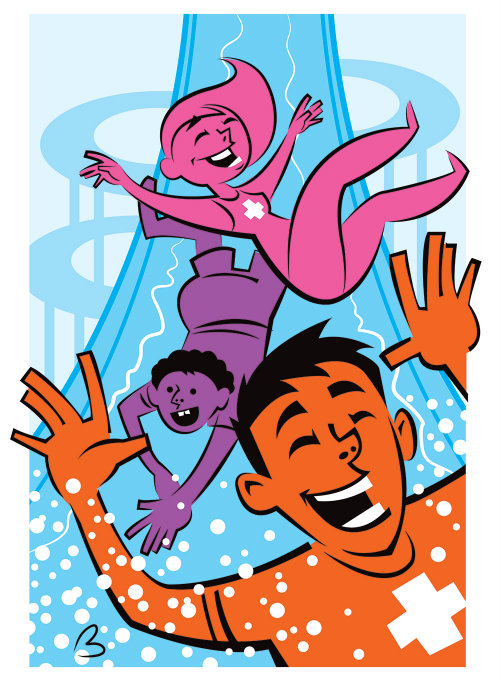If you are a manager in the aquatics field and summer 2015 was the same for you as it was for me, you were understaffed the entire season. You, along with the rest of your support staff, probably completed work during the day, and lifeguarded at night, just to ensure facilities stayed open.
As working conditions go, this is less than ideal. If you are tired, so is your staff. Tired guards often will want to blow off a little steam by enjoying the pools and waterslides for a few minutes whenever they can. That’s when bad decisions are made and injuries can occur.
There is a right way and a wrong way to let off steam. On the fourth of July, I was lifeguarding at a remote location when I received a phone call from one of our supervisors at 8:30 p.m.. We had just come off thunder hold, had a half hour left in the workday, and he had let the lifeguards ride the waterslide while there were no guests. However, this waterslide is designed to be used with a tube. He was letting them ride it without tubes.
A lifeguard whacked her ankle against the slide and sprained it badly enough that she couldn’t guard for a month. She usually worked forty hours a week, so this was five more shifts we needed to cover. Are you feeling my pain yet?
The supervisor in question typically is one of the best on staff. How did this happen? He was tired; they were tired. He forgot that our safety is just as important as the guests’. In the 10+ years I’ve been in aquatics, I’ve witnessed the rationale: “We know the rules but when guests aren’t around, we know how to break the rules safely.” But in reality, the rules exist because the behaviors are dangerous, whether or not you are a beginner, an expert, or a lifeguard.
Furthermore, the slide in question had a history of enticing lifeguards into engaging in shenanigans. As a manager who knew this, how could I have prevented this accident? We tend to think as a team, but the person at the top needs to remember that the entire team ultimately takes its cues from one person: you. Here’s what you can do to prevent this situation.
1) If you have to lifeguard in addition to your regular duties, choose the facility that sees the most action, especially if it has a history of shenanigans. You might be tired, but you are hopefully the best decision-maker (because you became the boss for a reason, right?).
2) Training, training, training. Don’t just teach your guards how to watch out for the guests. Teach them how to watch out for each other as well. Use real life examples to demonstrate how important it is that we follow the very rules we enforce.
3) Follow up every week. Use data to drive home your point. For example, we had four easily preventable injuries last summer, due to people becoming complacent in their work practices. No manager wants to get that phone call. Share injury statistics (both guest and staff) so the lifeguards understand that even when they need to let off some steam, they are still lifeguards.



